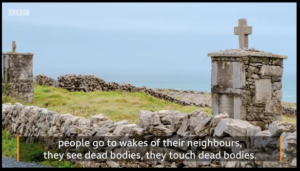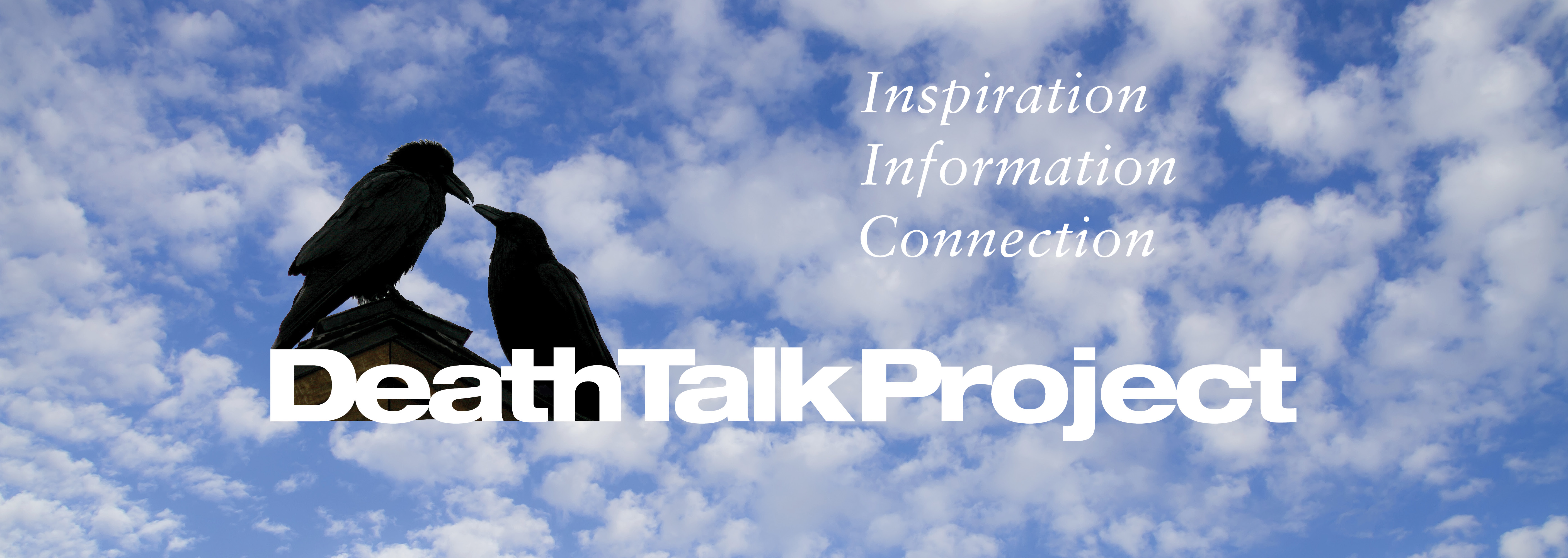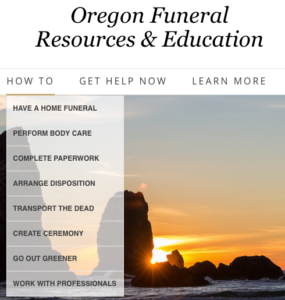What We Do vs What We Want: A Lament for What We’ve Lost

Death, according to the New York Times, is “having a moment in the sun.” Good news, or troubling?
The June 22 article, “The Positive Death Movement Comes to Life” is one of the most-forwarded links to hit my in-box and social media accounts, often accompanied by words of congratulations or encouragement.
In the midst of all that troubled me in this article (which touts death cafes, death doulas, a DeathLab, and a practice FUN-eral), I couldn’t help but think of the second-most forwarded link in recent months, a BBC video in which author Kevin Toolis talks about his father’s Irish wake, the subject of a book by that name.
“On my father’s island off the coast of Mayo,” Toolis says, “people go to the wakes of their neighbors; they see dead bodies; they touch dead bodies; they take children to those wakes. So even an ordinary life… would have seen 20, 30, 50, sometimes a hundred dead bodies.”
With this full connection to the natural cycle of life and death, the people of this place know What To Do when the dying time comes. They know how to recognize it, and how to respond.
In his description of the house filling with visitors, of the keeners who “cradled [his father] into death,” Toolis says: “This death was not a Western hospital death but a rite within an Irish clan, a way of dealing with death that was probably as old as the fall of Troy.”
So few of us, here on the receiving end of generations of conversion and emigration and the amnesia necessary to survive both, have any connection to the death rites of our ancestors. We no longer know what to do. And so it becomes about what we want – death as another opportunity for personal self-expression.
“Dying is a human experience,” Ellen Goodman says in the New York Times piece. “We’re trying to put the person back into the center of the experience.”
Better a person than a hospital or medical management system at the center – which is what, I believe, Goodman is seeking to rectify. But I’m struck by the loneliness of a singular “person” at the center. Human-making is not a singular proposition.
Toolis says, “I think the best way to deal with death is not to invent a new ritual or appoint another priest caste of bereavement counsellors or medical professionals. It is to do what we’ve always done – and that’s to gather together as fellow mortals in the face of our mortality and seek to bridge that moment of bereavement and loss together.”
Much of what I’ve seen, and helped to foster, in this current cultural “moment” does bring mortals together in the face of our mortality – but certainly not in ways “we’ve always done”… and frequently in ways that have little to do with bereavement, ways that frankly banish both grief and mystery. Death as a personal style event, the topic of “high culture discourse” as reported in the Times.
The loss of our knowledge, skills, and experience around death is something to be mourned and lamented. It’s not something that we can fix with a party, a conversation, or the proliferation of a new cadre of death care professionals.
Even as I myself am one of that new cadre, as I spend my days cobbling together creative responses to death care and remembrance rituals despite the poverty of my own lineage in these matters, I continue to feel as I did two-and-a-half years ago after producing a 500-person event that would have fit right in to the Times article: more sober than giddy about how we come to death in our time.
I heard a story once – I believe it was attributed to Martin Prechtel – about a headman in a Latin American village who was dying. The missionaries said, “We have to get you to the hospital. If you die, what will happen to your people?” And the headman responded something like this: “When I die, my people will gather from far and wide, and make all of our traditional foods, and sing all our songs, and tell all our stories. So if I don’t die, what will happen to my people?”
He was not to be at the center of his death. The village was at the center, the ongoingness of life that would be fed by his death.


Thanks Holly–oh so clear and appreciated. My relationships and the services/rituals I am honored to join are so much richer, wider and more deeply connected than I knew possible. Thanks to these inquiries and wonder-ments from you.
The chance to learn from and with you and your neighbors on the North Coast, Claudia, to think together about dying in community, about building communities where dying has a chance to be learned – rich, and wide, and deep, indeed. xoh
Oh YES! YES! I’m deeply grateful for your words here. Thank you
<3
yes, the ongoingness of life is fed by death. thanks for that turn of phrase.
What a thoughtful and beautifully written response to what our culture is doing with the ‘death movement’. Thank you Holly! I’m with you all the way and doing my best to hold steady with Sacred Crossings amidst this mighty storm. 🙂 With great love, appreciation and gratitude, Olivia
Olivia, thank you for writing. I’ve gotten several private messages as well from others doing this work who are equally troubled by this cultural “moment” death is said to be enjoying. Let’s continue to be troubled together. With love and respect to you, Holly
Thank you for these beautiful thoughts so perfectly expressed.